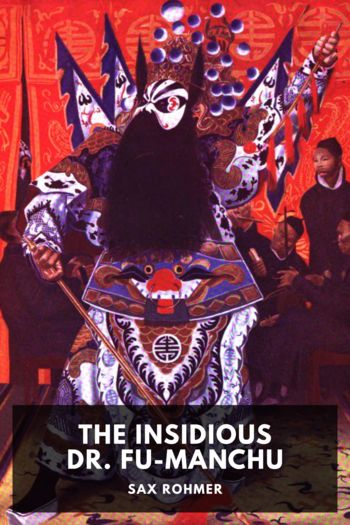The Insidious Dr. Fu Manchu - Sax Rohmer (best ebook reader TXT) 📗

- Author: Sax Rohmer
- Performer: -
Book online «The Insidious Dr. Fu Manchu - Sax Rohmer (best ebook reader TXT) 📗». Author Sax Rohmer
of that man, when they mean death to so many?”
“Death! I have seen my own sister die of fever in the desert—
seen her thrown like carrion into a hole in the sand.
I have seen men flogged until they prayed for death as a boon.
I have known the lash myself. Death! What does it matter?”
She shocked me inexpressibly. Enveloped in her cloak again,
and with only her slight accent to betray her, it was dreadful
to hear such words from a girl who, save for her singular type
of beauty, might have been a cultured European.
“Prove, then, that you really wish to leave this man’s service.
Tell me what killed Strozza and the Chinaman,” I said.
She shrugged her shoulders.
“I do not know that. But if you will carry me off”—she clutched me
nervously—“so that I am helpless, lock me up so that I cannot escape,
beat me, if you like, I will tell you all I do know. While he is
my master I will never betray him. Tear me from him—by force,
do you understand, BY FORCE, and my lips will be sealed no longer.
Ah! but you do not understand, with your `proper authorities’—
your police. Police! Ah, I have said enough.”
A clock across the common began to strike. The girl
started and laid her hands upon my shoulders again.
There were tears glittering among the curved black lashes.
“You do not understand,” she whispered. “Oh, will you
never understand and release me from him! I must go.
Already I have remained too long. Listen. Go out without delay.
Remain out—at a hotel, where you will, but do not stay here.”
“And Nayland Smith?”
“What is he to me, this Nayland Smith? Ah, why will you not unseal my lips?
You are in danger—you hear me, in danger! Go away from here tonight.”
She dropped her hands and ran from the room. In the open doorway she turned,
stamping her foot passionately.
“You have hands and arms,” she cried, “and yet you let me go.
Be warned, then; fly from here—” She broke off with something
that sounded like a sob.
I made no move to stay her—this beautiful accomplice of the arch-murderer,
Fu-Manchu. I heard her light footsteps paltering down the stairs, I heard
her open and close the door—the door of which Dr. Fu-Manchu held the key.
Still I stood where she had parted from me, and was so standing when a key
grated in the lock and Nayland Smith came running up.
“Did you see her?” I began.
But his face showed that he had not done so, and rapidly I told
him of my strange visitor, of her words, of her warning.
“How can she have passed through London in that costume?”
I cried in bewilderment. “Where can she have come from?”
Smith shrugged his shoulders and began to stuff broadcut mixture
into the familiar cracked briar.
“She might have traveled in a car or in a cab,” he said;
“and undoubtedly she came direct from the house of Dr. Fu-Manchu.
You should have detained her, Petrie. It is the third time we
have had that woman in our power, the third time we have let
her go free.”
“Smith,” I replied, “I couldn’t. She came of her own free will to give
me a warning. She disarms me.”
“Because you can see she is in love with you?” he suggested, and burst
into one of his rare laughs when the angry flush rose to my cheek.
“She is, Petrie why pretend to be blind to it? You don’t know
the Oriental mind as I do; but I quite understand the girl’s position.
She fears the English authorities, but would submit to capture by you!
If you would only seize her by the hair, drag her to some cellar,
hurl her down and stand over her with a whip, she would tell you
everything she knows, and salve her strange Eastern conscience with
the reflection that speech was forced from her. I am not joking;
it is so, I assure you. And she would adore you for your savagery,
deeming you forceful and strong!”
“Smith,” I said, “be serious. You know what her warning meant before.”
“I can guess what it means now,” he rapped. “Hallo!”
Someone was furiously ringing the bell.
“No one at home?” said my friend. “I will go. I think I know
what it is.”
A few minutes later he returned, carrying a large square package.
“From Weymouth,” he explained, “by district messenger.
I left him behind at the docks, and he arranged to forward any
evidence which subsequently he found. This will be fragments
of the mummy.”
“What! You think the mummy was abstracted?”
“Yes, at the docks. I am sure of it; and somebody else
was in the sarcophagus when it reached Rowan House.
A sarcophagus, I find, is practically airtight, so that the use
of the rubber stopper becomes evident—ventilation. How this
person killed Strozza I have yet to learn.”
“Also, how he escaped from a locked room. And what about the green mist?”
Nayland Smith spread his hands in a characteristic gesture.
“The green mist, Petrie, can be explained in several ways.
Remember, we have only one man’s word that it existed.
It is at best a confusing datum to which we must not attach
a fictitious importance.”
He threw the wrappings on the floor and tugged at a twine loop
in the lid of the square box, which now stood upon the table.
Suddenly the lid came away, bringing with it a lead lining,
such as is usual in tea-chests. This lining was partially attached
to one side of the box, so that the action of removing the lid
at once raised and tilted it.
Then happened a singular thing.
Out over the table billowed a sort of yellowish-green cloud—
an oily vapor—and an inspiration, it was nothing less,
born of a memory and of some words of my beautiful visitor,
came to me.
“RUN, SMITH!” I screamed. “The door! the door, for your life!
Fu-Manchu sent that box!” I threw my arms round him.
As he bent forward the moving vapor rose almost to his nostrils.
I dragged him back and all but pitched him out on to the landing.
We entered my bedroom, and there, as I turned on the light,
I saw that Smith’s tanned face was unusually drawn,
and touched with pallor.
“It is a poisonous gas!” I said hoarsely; “in many respects
identical with chlorine, but having unique properties which prove
it to be something else—God and Fu-Manchu, alone know what!
It is the fumes of chlorine that kill the men in the bleaching
powder works. We have been blind—I particularly. Don’t you see?
There was no one in the sarcophagus, Smith, but there was enough
of that fearful stuff to have suffocated a regiment!”
Smith clenched his fists convulsively.
“My God!” he said, “how can I hope to deal with the author of such a scheme?
I see the whole plan. He did not reckon on the mummy case being overturned,
and Kwee’s part was to remove the plug with the aid of the string—after Sir
Lionel had been suffocated. The gas, I take it, is heavier than air.”
“Chlorine gas has a specific gravity of 2.470,” I said;
“two and a half times heavier than air. You can pour it from
jar to jar like a liquid—if you are wearing a chemist’s mask.
In these respects this stuff appears to be similar; the points
of difference would not interest you. The sarcophagus would
have emptied through the vent, and the gas have dispersed,
with no clew remaining—except the smell.”
“I did smell it, Petrie, on the stopper, but, of course,
was unfamiliar with it. You may remember that you were
prevented from doing so by the arrival of Sir Lionel?
The scent of those infernal flowers must partially have
drowned it, too. Poor, misguided Strozza inhaled the stuff,
capsized the case in his fall, and all the gas—”
“Went pouring under the conservatory door, and down the steps, where Kwee
was crouching. Croxted’s breaking the window created sufficient draught
to disperse what little remained. It will have settled on the floor now.
I will go and open both windows.”
Nayland raised his haggard face.
“He evidently made more than was necessary to dispatch Sir Lionel Barton,”
he said; “and contemptuously—you note the attitude, Petrie?—
contemptuously devoted the surplus to me. His contempt is justified.
I am a child striving to cope with a mental giant. It is by no wit
of mine that Dr. Fu-Manchu scores a double failure.”
I WILL tell you, now of a strange dream which I dreamed, and of the stranger
things to which I awakened. Since, out of a blank—a void—this vision
burst in upon my mind, I cannot do better than relate it, without preamble.
It was thus:
I dreamed that I lay writhing on the floor in agony indescribable.
My veins were filled with liquid fire, and but that stygian darkness
was about me, I told myself that I must have seen the smoke arising
from my burning body.
This, I thought, was death.
Then, a cooling shower descended upon me, soaked through skin
and tissue to the tortured arteries and quenched the fire within.
Panting, but free from pain, I lay—exhausted.
Strength gradually returning to me, I tried to rise; but the carpet
felt so singularly soft that it offered me no foothold.
I waded and plunged like a swimmer treading water; and all about me
rose impenetrable walls of darkness, darkness all but palpable.
I wondered why I could not see the windows. The horrible idea
flashed to my mind that I was become blind!
Somehow I got upon my feet, and stood swaying dizzily.
I became aware of a heavy perfume, and knew it for some
kind of incense.
Then—a dim light was born, at an immeasurable distance away.
It grew steadily in brilliance. It spread like a bluish-red stain—
like a liquid. It lapped up the darkness and spread throughout the room.
But this was not my room! Nor was it any room known to me.
It was an apartment of such size that its dimensions filled me with a
kind of awe such as I never had known: the awe of walled vastness.
Its immense extent produced a sensation of sound. Its hugeness had
a distinct NOTE.
Tapestries covered the four walls. There was no door visible.
These tapestries were magnificently figured with golden dragons;
and as the serpentine bodies gleamed and shimmered in the
increasing radiance, each dragon, I thought, intertwined its
glittering coils more closely with those of another.
The carpet was of such richness that I stood knee-deep in its pile.
And this, too, was fashioned all over with golden dragons; and they
seemed to glide about amid the shadows of the design—stealthily.
At the farther end of the hall—for hall it was—a huge table
with dragons’ legs stood solitary amid the luxuriance of the carpet.
It bore scintillating globes, and tubes that held living organisms,
and books of a size and in such bindings as I never had imagined,
with instruments of a type unknown to Western science—a heterogeneous
litter quite indescribable, which overflowed on to the floor,
forming an amazing oasis in a dragon-haunted desert of carpet.
A lamp hung above this table, suspended by golden chains from
the ceiling-which was so lofty that, following the chains upward,
my gaze lost itself in the





Comments (0)